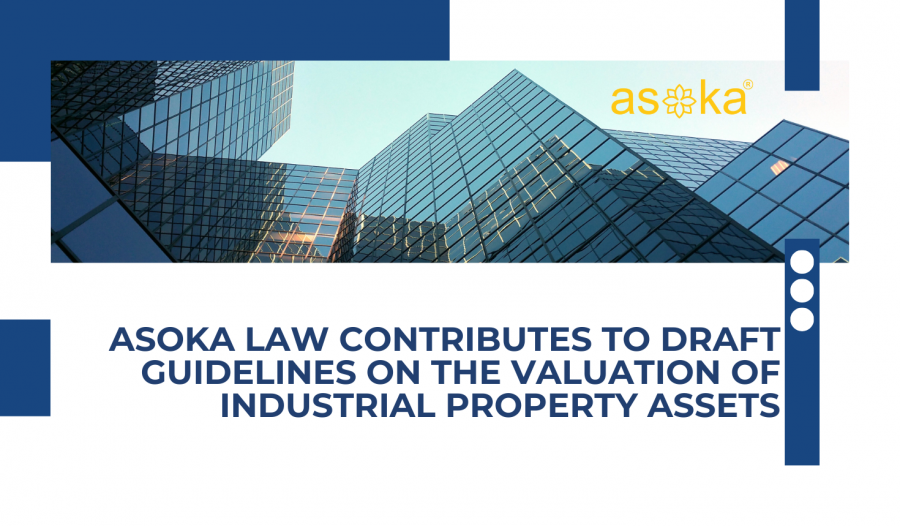An Asoka Law knowledge hub on the legal and strategic aspects of IP commercialization, including valuation, licensing, assignment, and IP-based business structures.
On August 10, 2025, the Intellectual Property Office of Vietnam (IP Viet Nam) under the Ministry of Science and Technology officially released the Draft “Reference Guidelines on the Valuation of Industrial Property Assets (patents, trademarks, industrial designs)” for public consultation. This is an important step towards establishing a legal framework for the valuation of intellectual property assets - one of the key instruments to facilitate the commercialization of patents, trademarks, industrial designs, and other industrial property rights.
As an industrial property representative (registration code 443) and a law firm specialized in intellectual property, Asoka Law has formally submitted its comments, providing a number of practical recommendations and comparative insights based on international standards.

In addition to the valuation purposes already enumerated in the Draft, Asoka Law proposed six additional categories that are crucial in supporting enterprises in Vietnam, especially foreign investors, in areas such as enforcement, public policy, technology transfer, equitization, and national strategies. These include:
Valuation for tax and transfer pricing purposes in related-party transactions.
Valuation for litigation and enforcement of judgments (in accordance with the Law on Civil Judgment Enforcement).
Valuation for the preparation of financial statements under IFRS/IAS, insurance of intangible assets, and public policy-making.
Valuation for purposes of technology transactions and foreign direct investment.
Valuation for equitization and listing on the securities market.
Valuation for national strategies, research and development, and innovation programs.
The Draft currently focuses on three core industrial property objects: patents, trademarks, and industrial designs. While this is a necessary starting point, it does not fully capture the broader spectrum of intellectual property assets that generate significant revenue streams for businesses. In practice, two categories within industrial property frequently require valuation but are not addressed: trade secrets and trade names. Moreover, other intangible assets such as databases, computer programs, and copyright and related rights are increasingly important and should be covered under appropriate valuation guidance.
For trade secrets, value derives not from registration but from secrecy and the competitive advantage gained. Valuation must therefore be linked to (i) proof of protective measures, (ii) incremental economic benefits, (iii) replacement/re-creation costs, and (iv) risks of disclosure or misappropriation.
For trade names, value arises from legitimate use in commerce. Valuation should reflect (i) reputation and consumer recognition, (ii) revenue and profit margins attributable to the trade name, (iii) continuous use evidenced by invoices, contracts, online presence, domain names, etc., and (iv) risks of confusion or conflicts with registered trademarks.
Databases and computer programs are intangible assets generating income from licensing or subscriptions. Valuation requires clarification of (i) legal basis of rights (often copyright), (ii) control of access and anti-copying measures, (iii) revenue models (perpetual license, subscription, maintenance, upgrades), (iv) maintenance and useful life costs, and (v) risks of technological obsolescence.
For copyright and related rights (musical works, films, broadcasts, performances), revenue stems from licensing, collective management fees, synchronization, and public performance. Given the different authority in charge, Asoka recommends that a parallel guidance document (or annex) be developed under the competent copyright authority, harmonized with the valuation framework for industrial property but tailored to the distinct features of these rights.
In summary, Asoka recommends expanding the scope of application in two directions: (1) within industrial property, to include trade secrets and trade names; and (2) in parallel, to issue a separate guideline for databases, computer programs, copyright and related rights.
Asoka Law welcomes the Draft’s initial attempt to develop separate criteria for patents, trademarks, and industrial designs. This is a progressive step, recognizing that valuation must account for the unique characteristics of each type of asset. For instance, patents require technical and industrial applicability analysis; trademarks depend on reputation and consumer recognition; industrial designs are influenced by aesthetic trends and product life cycles.
Nevertheless, based on international practice and Asoka’s professional experience, limiting the analysis to legal, technical, and economic criteria is insufficient. A general criterion on risks and uncertainties should be included. This aligns with international valuation standards (IVS 210), WIPO guidelines, and OECD transfer pricing rules. Intellectual property may generate significant economic benefits in stable conditions, but value is highly sensitive to legal risks (disputes, invalidation), technological risks (substitution by new technology), and market risks (shifts in consumer demand).
Asoka therefore proposes adding a general criterion applicable to all intellectual property assets requiring valuation reports to present sensitivity analysis of key assumptions (e.g. growth rates, discount rates, royalty rates). This would improve the realism, transparency, and utility of valuation reports for commerce, finance, litigation, and policymaking.
Asoka Law will publish a series of in-depth articles elaborating on each recommendation:
With specialized expertise and practical experience, Asoka Law is committed not only to fulfilling its duties as an industrial property representative, but also to working alongside state authorities and the business community to improve Vietnam’s IP valuation framework. We believe that accurate and transparent valuation will be the foundation for intellectual property to become a true driver of innovation, economic growth, and international integration.
Through continuous research and policy contributions, particularly via the Asoka Creative Experimentation Fund (ACEF), Asoka Law remains steadfast in its mission: “Born from IP. Built for IP” - transforming knowledge and professional practice into value for society. This is our long-term commitment to advancing Vietnam’s intellectual property system in harmony with global developments.